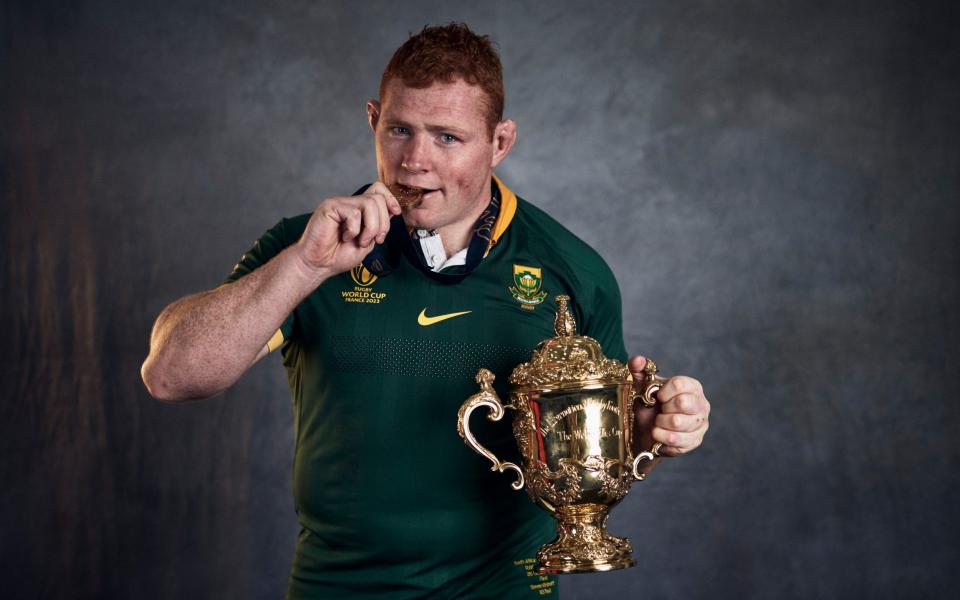Anger over the exodus of English players to France appears to have been lost on Steven Kitshoff, the last player from South Africa’s World Cup-winning team to play rugby abroad.
Kitshoff’s decision to join Ulster after the World Cup increased the number of overseas players in the Springboks’ 23-man squad that defeated New Zealand in the final to 16; Its captain Siya Kolisi is also now with Irish provincial champions Racing 92. The cup rivals are at Kingspan Stadium on Saturday.
Such a free market selection policy stands in stark contrast to the English game, where any player living outside the country is deemed ineligible for selection to the national team since the implementation of a strict overseas selection policy agreed by the Rugby Football Union. and Premiership Rugby in 2011.
This policy is now being stress-tested like never before, given the lucrative draw for young English players to play in France and Japan; Henry Arundell, 21, is the latest player to turn his back on international rugby after signing a new contract extension. He will remain in France with Racing until 2026.
Kitshoff, who now has two World Cup champions medals having also played in the 2019 tournament, is well placed to witness the benefits of playing abroad, having spent two seasons at Bordeaux-France, interrupting his 10-year spell with the Stormers. A new chapter opens in Bègles and now Belfast.


While the RFU’s policy is to protect the integrity of the Premier League, the 31-year-old says South Africa takes the opposite view and values the benefit of sending its best talent abroad.
“It’s been good for the Boks, having success with almost half the players playing abroad, learning different styles of rugby, taking that knowledge and bringing it to the Boks camp and everyone grows from it,” said Kitshoff, who has 83 caps. South Africa.
“Like Ireland, it’s tough in South Africa with four professional teams that can only sign 50 to 55 players, and after 10 years I almost felt like I was taking a young player’s position away from him. He would play three matches while I was away from the Boks and when I came back he would be sent off again.
“So having 200 South Africans playing abroad opens up a lot of room for our young talent to emerge and develop as rugby players and when they leave to go abroad the next batch of young players comes along.
“So I think it gives you a greater talent base to choose from, but it also allows guys to leave their family home, learn new cultures, meet new people, work with new style coaches and improve their individual game. It’s a much bigger upside than a downside.”
Kitshoff revealed he consulted the Springboks’ director of rugby Rassie Erasmus before signing a three-year deal with Ulster.
“He was very supportive of the idea,” Kitshoff added. “I think the Irish clubs have a good understanding having worked at Munster for a number of years and also having Jacques (Nienaber, former South Africa head coach) currently here with Leinster.”


It’s now a well-traveled road from South Africa to Belfast, with word-of-mouth recommendations from previous players such as Ruan Pienaar, Marcell Coetzee and Duane Vermeulen acting as invaluable recruiting sergeants.
But it’s a two-way street. Kitshoff’s recruitment by Ulster head coach Dan McFarland was partly to bolster his side’s attacking prowess but also to help develop the next generation of equipment in the province. Kitshoff made just three appearances for his new province following a break following South Africa’s emotional World Cup victory tour.
He has been on the losing side on each occasion and despite being part of an impressive Ulster front five, his attacks creaked worryingly in the opening Champions Cup defeat against Bath at The Rec. His message is simple: The honeymoon period is over.
“It takes a while but I see myself as a leader in scrums and I have many years of experience in international rugby and have played over 130 games for the Stormers so it’s a big part of my game and I know it’s important for me. “It’s been a lot over the last three weeks. “I wasn’t good but I’m looking forward to it getting better as the season progresses,” he added.
“I always say, you might lose a few scrum penalties in the rounds but when it comes to knockouts you want to win all your scrums. “I’d rather shoot now, develop and be a dominant attack.
“I had a nice chat with Dan this week. I didn’t want to hit any ground in the first few weeks but we had a really good session on Tuesday and a big improvement in our mentality. We had a lot more live attack than we had in the previous three weeks. There are many factors that affect a good offensive performance. To make sure you do this, you need to check all these boxes.
“Everyone was very friendly here, the coaches, players and fans were great but now things are back to the way they were. It’s not about being a double world champion, it’s about being an Ulsterman now and doing my best.”